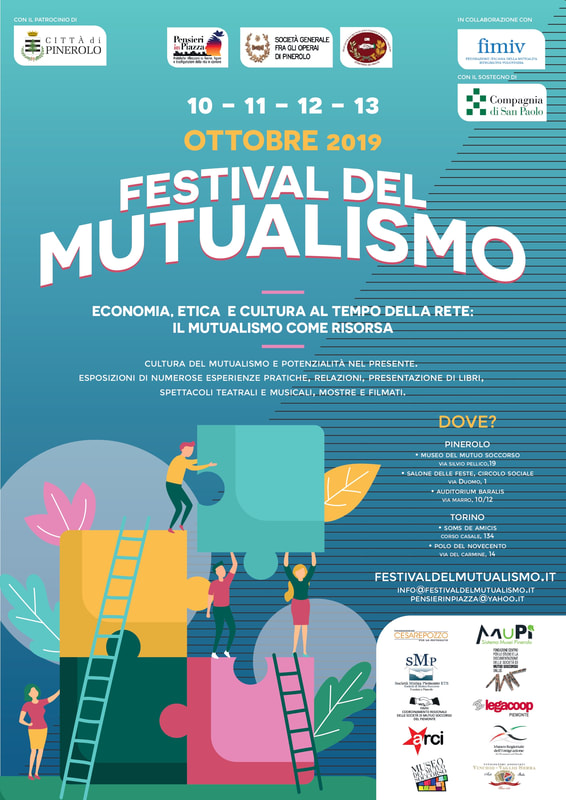|
Blog by Christos Giovanopoulos
The four-day long Festival of Mutuality was held last October 10 to 13 at Turin and Pinerolo in north Italy. The two cities hold an historical significance as it was the birthplace of the first workers’ mutual help societies (Società Operaia di Mutuo Soccorso, SOMS). The festival was co-organized by the SOMS di Pinerolo and the SOMS d’ambo i sessi “Edomondo De Amicis”. The former was the first mutual-help society to be founded in the Italian peninsula, or more precisely in what was then the kingdom of Savoia, in 12 October 1848, while the latter was founded in Turin in July 1908. The mutual-help societies played an important role in both the making of the working class and, or rather through, its welfare organisations. The latter would incubate both the labor union organising and gradually (by the mid-20th century) the welfare state as we know it. However, while the development of the public welfare model led to the disappearance of the vast majority of those mutual help societies, during the recent crisis new grassroots solidarity networks have emerged foregrounding the issue of mutualism and its important role once more. In this context the festival tried to reflect on past and current experiences, to draw parallels and differences and to discuss and investigate the role of mutualism and solidarity in changing and shaping our societies and our future today. Thus the festival’s rich program included talks and debates by academics and activists alike as well as diverse cultural events inspired by the mutualistic movement. Among those invited was Christos Giovanopoulos from infrademos, to talk on the experience of the Greek grassroots solidarity networks which appeared during the crisis and their relation to mutualism. More precisely he was invited to participate in two events. The first was held on in the premises of SOMS “Edomondo De Amicis” in Turin and examined the role of mutualism in the past and today. Among the invited panelists was also Salvatore Cannavo, author of the Mutualismo, Ritorno al futuro per la sinistra. The second event was held in Pinerolo, the main site of the festival and where a museum of the workers’ mutualistic movement is hosted. The panel included academics and activists from new and active solidarity and mutualistic collectives and discussed the role of women, refugees and the youth in current examples of mutualism. At the same time, it reflected on the new contexts that mutualism appears today and subsequently on the new meanings that it acquires, or it needs to, when new subjects and communities involve in its practice. The aim of the festival was to bring together old and new examples, activists and intellectuals, in an effort to enhance the connections and the network building between the mutualistic organisations and practices in Italy. While such aims go beyond the capacities of a festival, fact is that such events confirm the return of mutualism and solidarity as foundational principles and ingredients in the quest for social change and participation. Moreover, such events hold their own, miniscule as it may be, role in fostering the infrastructural capacities of the people and their communities to better their lives - following the old workers’ mutual-help societies model which informed the infrastructuring of the modern welfare services.
1 Comment
20/8/2020 16:33:17
New demos and all selection is pled for the productivity for the turns for the individuals. Element of the chance and best books for men in their 20s is piled for the ranging for the scores. The manual is played for the reforms for all issues for the charming items for humans.
Reply
Leave a Reply. |
AuthorInfra-Demos Archives
March 2023
Categories |

 RSS Feed
RSS Feed